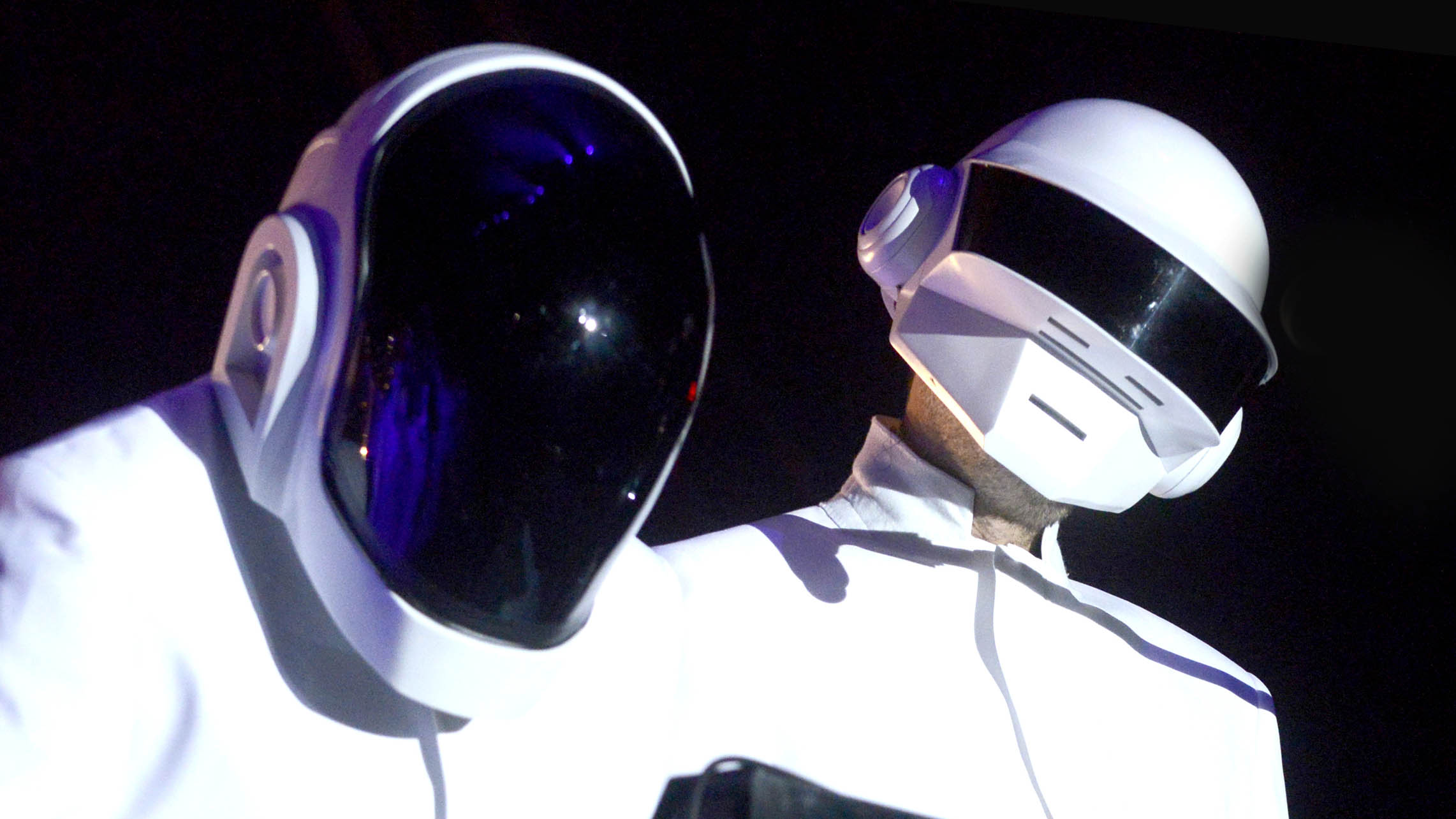5 tracks producers need to hear by... Daft Punk
Best of 2021: We say goodbye in the only way we know how: by selecting five moments of genre-defining brilliance from the men behind the masks

Want all the hottest music and gear news, reviews, deals, features and more, direct to your inbox? Sign up here.
You are now subscribed
Your newsletter sign-up was successful
Best of 2021: The surprise departure of Daft Punk from electronic music’s mantle has left fans high and dry. After what some would argue was the career peak of 2013’s Random Access Memories there is no more… but don’t despair. Take a trip to robotic reverie with five tracks that we reckon best sum up the legacy of everyone’s favourite heavy-helmeted pals.
And with five tracks to pick and five studio albums to choose from, let’s do things right and deliver a career-spanning ultimate selection that takes in each sparkling slab.
1. Da Funk
It would be easy - but foolish - to bracket Daft Punk’s premier album as simply more ‘French disco’. Or ‘French Touch’. Or ‘Filter Disco’. Call it what you like, but this is so much more than chunks of groove floating in and out over a fat house beat.
If a criticism could be levelled at Daft Punk’s first album, Homework, it’s that it’s precisely that - homework. An experiment into how its producers could stretch a brilliant new idea in every which way without stepping off the concept.
The result is that the album is homogenized, a tight time capsule that still to this day sounds like no other, but back to back, start to finish in 2021, it’s a challenging listen that outstays its welcome and doesn’t have 1997’s breath of pure originality.
Relief from the super-tough beats and challenging repetition come in the form of singles Around the World and - our pick by a whisker - Da Funk. While ATW is distinctive through its talkbox vocal line, it’s the raw, growling synths and sampled ‘live’ drumming of Da Funk that get us every time.

There’s depth and warmth alongside the off-the-chart super-tight transient impact and, while the track is so obviously a digital product, the distorted analogue synths bring to mind far more retro, funkier themes - and the tempo and bass place the track firmly in Another One Bites The Dust territory.
Want all the hottest music and gear news, reviews, deals, features and more, direct to your inbox? Sign up here.
That said, this is no plodding rock homage. Listen to how the hi-hats swing the track at 2:09 before the growling TB-303 bassline sneaks in and eventually dominates from 2:25, while the track’s conclusion from 5 minutes onwards has every meter in the red.
Da Funk reached number 7 in the UK singles chart and number 26 in the US Hot Dance Singles Sales.
2. Aerodynamic
If 1997’s Homework was an interesting, highly credible curio, then 2001’s follow-up, Discovery, was the band official sealing the deal - Daft Punk were something special and they were going to stick around and take some time to explain exactly why.
Discovery goes next level with smoother, more palatable, less caustic soundscapes. Instead of an album bent on redefining the boundaries of ‘music’ and taking your ears on a journey as painful as it is interesting, Discovery, from lead track One More Time to Too Long, is a wiser, smarter affair that pushes the dial to eight, where it sounds great, rather than 10 just because it can.
And it’s well worth considering that the band had spent four years making it. Rather than plunder the zeitgeist with a rack of on-trend tunes and then either simply disappear or rebrand in order to wipe history and begin again, Daft Punk really meant it. This wasn’t just music to get them noticed, this was the music they genuinely wanted to make. If Homework was them searching for something that made them different, then Discovery was them finding it.
While it was lead single (and track one) One More Time that served as the perfect introduction to this delightful confection, our pick from Discovery is Aerodynamic, a disco/rock/electronic track in three movements that clock in at a combined three minutes and 30 seconds.
After the doomy clanging intro we’re quickly neck-deep in a crunchy, bit-crushed and flanged shuffling beat lifted (but sliced and resequenced) from Sister Sledge’s 1982 album track, Il Macquillage Lady. However, it’s the central ‘metal’ movement that really seals the deal. That this finger-tapping Halen-esque arpeggio (easily as hard-rocking as any card-carrying metal) is then fused over the Sledge beat without the listener crying foul is even more remarkable.
The clangs return and the final movement, from 2:28, is suddenly pure Wendy Carlos, reworking that arpeggio with warm analogue synths over a 100% synthetic beat.
Surprisingly, despite being instantly recognisable and known as a DP classic, Aerodynamic only reached number 97 in the UK upon its single release and was the B-side of the more conventionally melodic Digital Love in the States (number nine in the Billboard club charts).
3. Robot Rock
It feels more than a little mean to talk about 2005’s Human After All as Daft Punk’s ‘low point’. But remember, every band has to have one, and DP’s lowest ebb is still an awe-inspiring listen, despite a fleeting number 10 UK chart placing and a number 98 US Billboard appearance.
Title track Human After All elegantly exhibits the new simplicity but fails to ignite or expand upon its basic idea, notching up a 5:20 running time without particularly going anywhere or setting the scene for any kind of (much expected) DP revolution.
We offer a hat-doff to the bizarre Glitter-beat of The Prime Time of Your Life, but track four, Steam Machine, feels like a poor imitation of previous greats, and sets the scene for further shoulder-shrugging mehs to come.
Simply put, we have to select single Robot Rock from the bunch, simply by virtue of it being the best track on board. Sure, Technologic is smarter and fresher and more original but Robot Rock remains irresistible - despite it owing a major debt to Breakwater’s Release The Beast.
Perhaps most tellingly, after the 16- and 14-track volumes of Homework and Discovery, Human After All is spent at an adequate (but less than luxurious) 10, with one track, On/Off, being nothing more than a 20-second-long blast of TV noise. File under ‘could do better’.
4. Recognizer
The story of Daft Punk’s involvement with the Tron: Legacy movie soundtrack is an odd one, but at its heart it’s Disney executives making the less than crazy ‘leap’ of teaming a digital, classic sci-fi reboot movie in need of a soundtrack with a world-famously hip electronic band consisting of two robots…
In 2007 Daft Punk were at the height of their Alive 2007 touring exploits, manning their famous black pyramid which, at the climax of the show, would pulse with neon edging in the manner of the under-appreciated, often maligned 1992 classic Tron. So, it didn’t take a genius to put Tron 2 and the two Daft Punk members together.
In actuality however, the pursuit of Daft Punk took years to complete, beginning even before the Tron reboot had a director on board, with various Disney execs trying and failing to get to the band or come anywhere near to getting them to sign on the line. That even Disney were simply unable to spin the rolodex and get Daft Punk on the phone is testament to just how secretive, unapproachable and unpredictable the band were, and remained to the last.
Eventually, talks zeroed in on target, with Disney even suggesting that the band work alongside a famous soundtrack composer (Hans Zimmer and Alexandre Desplat were mooted) if that was what it would take to get them on board. Still, the answer was no.
What if we built you a studio, offered Disney? The Jim Henson company (creator of The Muppets) had the Henson Recording Studios near where the Disney execs were based. Daft Punk could take over the building if that would seal the deal? Instead, Daft Punk took on a tiny control room at the studio most famous for hosting the recording of 1985’s smash We Are The World charity single and proceeded to fill the windowless room with gear.
Incredibly, the band worked exclusively on the Tron: Legacy soundtrack for 19 months, their only other diversion being a central role in 2010’s Star Wars cantina-based Adidas World Cup ad. The soundtrack was even ready in rough form before principal shooting began, meaning that director Joseph Kosinski was able to play the music on set to get everyone in the mood.
Yes, it turns out that - unsurprisingly - the band were huge fans of the original movie, so much so that when Kosinski met them to discuss their soundtrack, they spent more time discussing if he was the right man to do the sequel justice.
And so attached were the band to their new studio at Henson that they used it for the recording of Random Access Memories, the album that followed in 2013.
In fact, so amenable were Daft Punk to the entire Tron project that they even entertained Disney’s suggestions that they record a single for release, lining up none other than Jay-Z to provide vocals. The result was Computerized; however - and amazingly after all the years of work and the securing of such global superstars - Disney deemed the track too much of a diversion from the movie and the album’s pure sci-fi core, and so it languished in secret for years, absent from the finished disc and special editions. However, thanks to the miracle of the internet you can finally check it out for yourself.
While it’s the more familiar Daft Punk analogue swinging and thumping of Derezzed that was finally chosen for the single - full of glitched edits and distorted synths - it’s the orchestra-meets-synths clash of Recognizer that we feel best typifies what the band were trying to achieve. Once again, the influence of electronic pioneer Wendy Carlos (who crafted the original Tron movie’s soundtrack) is here in spades, while the score’s End of Line easily evokes the Intro Theme from Giorgio Moroder’s equally brilliant Scarface soundtrack.
5. Instant Crush
It’s hard to overstate the impact of Random Access Memories, Daft Punk’s 2013 album swansong. It seemed to strike at exactly the right moment and - no matter what kind of music you were into - it really felt like the whole planet was listening to this one album all at the same time. And loving it. Was there even anyone else making music (and daring to release it) in May 2013? We don’t remember.
The build-up started with a series of anticipation-building videos that gradually introduced the world to the all-conquering Get Lucky. Using this canny promotional strategy, the band laid out their remit for the album and, magically, everyone simply hopped on board. Gone were the hard, metallic machine tones and rhythms of previous robotic efforts, replaced by ‘live’ sounds, feel, a sense of air and movement and genuine funk.
Don’t get us wrong - Daft Punk have always been funky, but Get Lucky funks in a way that was totally alien to the band previously. Where the robots had once sat atop a black pyramid, jabbing buttons and turning dials, now they were playing bass and drums alongside Nile Rodgers and genuinely grooving. And yet, somehow, that Daft Punk had made a trés Chic (literally) ‘70s disco album felt like the most natural thing in the world.
Our pick of the RAM bunch is the laid-back and gorgeous Instant Crush, with The Strokes’ Julian Casablancas on lead vocals and guitar. In fact, Casablancas gets a co-production credit; while at one turn he brings typically Strokes-esque intent, by willingly submitting to the Daft Punk ‘sad robot’ vocoder treatment, he also delivers a sense of melancholy to a track surrounded by euphoric bangers.
If you’re anything like us, you’ll occasionally have pondered what Daft Punk might have been up to over the past few years. We may never know, but it seems that the band - faced with the unenviable prospect of following up Random Access Memories - simply opted to dip out on top instead. If it couldn’t be bested adequately then why would they try?
Perhaps the table-turning exercise of RAM was a trick they could only pull once; what would a Daft Punk 2021 album even sound like? Pop? Glam? New wave? Or something completely unimagined? We will never know.


Daniel Griffiths is a veteran journalist who has worked on some of the biggest entertainment, tech and home brands in the world. He's interviewed countless big names, and covered countless new releases in the fields of music, videogames, movies, tech, gadgets, home improvement, self build, interiors and garden design. He’s the ex-Editor of Future Music and ex-Group Editor-in-Chief of Electronic Musician, Guitarist, Guitar World, Computer Music and more. He renovates property and writes for MusicRadar.com.
